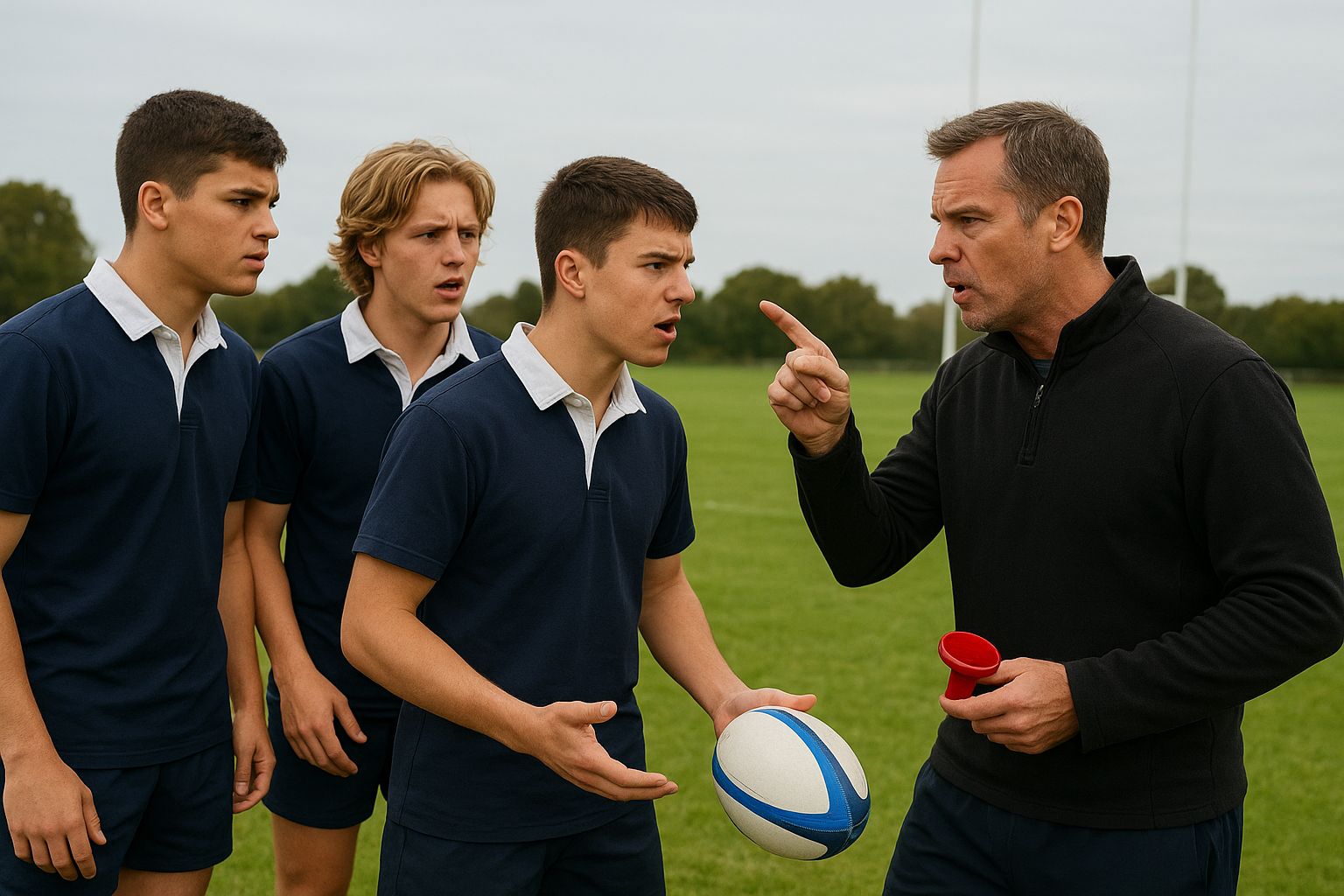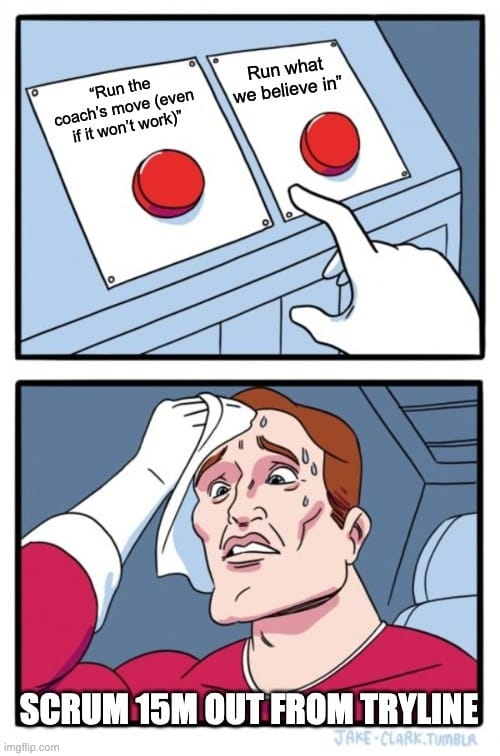- The Deep Dive
- Posts
- Power Dynamics between Coaches and Players
Power Dynamics between Coaches and Players
Maybe there isn't much difference between the All Blacks and secondary school rugby teams

Table of Contents
Power Dynamics Between Coaches and Players
In the middle of an All Blacks test, Head Coach Graham Henry turned to his assistant Steve Hansen and asked:
“Why isn’t he [Dan Carter – arguably the greatest Number 10 to ever play the game] calling the move?”
“I don’t know, Graham,” Hansen replied.
A week later, same game situation. Again, Henry asked:
“Why isn’t he calling the move here… probably a good place to call it.”
“I don’t know, Graham.”
By the third week, Henry was getting frustrated.
“Is he calling that move?”
“No, Graham.”
“Why the hell not?”
This time Hansen gave the real answer.
“Because he [Carter] doesn’t believe in it. And he calls the move, so if he doesn’t believe in it, he ain’t going to call it. So, it’s never going to happen. You can practice it as much as you like, but we ain’t doing it!”
Henry paused, then snapped back:
“Well, why the hell didn’t you tell me that three weeks ago!”

Dan Carter and Steve Hansen discussing how to break it to Graham Henry that the players won’t run “that move” (I assume)
Last newsletter we looked at how controlling behaviours by the coach can impact the environment and players. But coach–athlete relationships are just that - relationships. And the athletes are not passive participants. It means there are always power dynamics at play.
This was a major theme that emerged in my research into 1st XV players’ perceptions of their coaching environment. It showed up in a few different ways:
1. Who takes responsibility when things go wrong
Because of the controlling behaviours exhibited by coaches, one participant summed up their feelings as:
“No, if it [decision on-field] goes wrong, that’s not on you though; that’s on the coaches.”
2. Who makes tactical decisions during the match
Another way power dynamics surfaced was in on-field tactical calls. Players described moments where there were disagreements between the players and coaches on what call to make:
Team 1:
“I remembered in our semi-final last year. There was like 5 minutes to go, maybe 10, and we chose to take a kick. The whole team - I think at least the forwards - really wanted to kick for touch. They [the coaches] sort of just ran on the [kicking] tee…and we didn’t have a decision. Even the captain was like, wanting to kick for touch. We had just scored from the lineout maul… Our kicker hadn’t been kicking well. Then we had chosen to kick for touch but then the tee got brought on and we weren’t allowed to change the decision because the tee was on the field.”
The frustration was obvious. One player remembered:
“I remember hearing the kicker just yell ‘Oh F##k’.”
Team 2:
“The biggest moment I remember… we got a penalty right in front of the sticks and they [the coaches] went to bring the tee on… [a player] told them to f### off and we took a scrum. Then they were pissed about that; that we took it. But… we made the decision, that’s what we wanted to do.”

AI’s best effort of rugby players arguing with their coach (who is holding a kicking tee)
3. Whether training actually transfers to matches
Finally, perhaps the most striking example was eerily similar to the All Blacks story on player belief in training moves.
I asked the players about the moves they run during a game and here is what they said:
“I know that there’s some players who don’t agree with some of the moves we run — not the ones we created ourselves, but the ones the coach uses. Some boys think they’ll never work.”
(SM): “So if you’ve got moves you don’t think are going to work, do you end up using them?”
“Mmmmm… no.”
(SM): “No?”
“No!”
(SM): “So, are they just sort of moves you have?”
“Run at training, not on game day.”
Players explained that they will not run moves they do not believe in during games. They won’t bring it up with the coach because they didn’t want to be seen disrespecting the authority or were worried about the reaction. However, if they did run those moves in games and they failed, the coaches would probably change them:
“Yeah, ’coz, like, say if we ran that move that wasn’t working and it didn’t work… then, ’coz we analyse the moves we did run — like how they worked — I reckon if we ran it and it didn’t work, they’d probably change it after that.”

This creates a bizarre cycle: players won’t run the moves, players don’t tell the coaches, and the coaches never get evidence to review them, therefore training time keeps being spent on tactics that will never make it onto the field.
It’s almost comical — yet even at the All Blacks, with a one of the greatest players of all time and a legendary coach, the same thing happened. No one is immune to the impact of power dynamics.
My study focused on 16–18-year-old 1st XV players at school. Their school world is typically hierarchical in nature, which increases the chances they defer naturally to the coach as an authority figure. That makes it even harder for them to challenge the coach overtly, and even more important for the coach to bridge the gap.
But as Graham Henry and Steve Hansen discovered, it’s not just school kids who might not feel able to raise their concerns, leading to coaches wasting a serious amount of time training things players have no intention of following through on.
Power dynamics will always exist. The real question for coaches is whether you ignore them, or whether you create an environment where players and coaches are genuinely aligned and truly own the game together.
This is the 2nd post based on the themes from my (Sam) recently published journal article - Secondary School 1st XV Rugby Players’ Perceptions of the Coaching Environment: A Qualitative Descriptive Study
The four themes are Coach Control, Power Dynamics, Expectations, and Brotherhood. You can read the first post on Coach Control here:
Players Opinions of Coach Control
Quote of the Week
People will rise to a challenge if it’s their challenge - make it their challenge.
An Even Deeper Dive
Watch Former All Black Head Coach Steve Hansen (who prior to being head coach, was an assistant coach to Graham Henry) tell the story of Dan Carter’s lack of belief in a particular move.
Want to discuss anything you’ve read? Email us at [email protected]. We’d love to hear from you!
Want to share the Deep Dive with friends? Just send them the link below to subscribe

